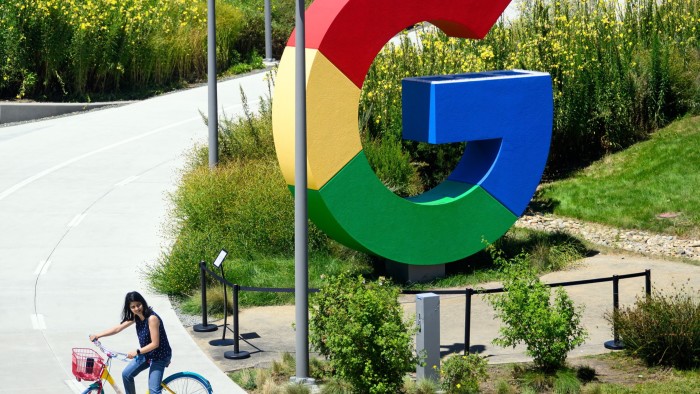
Unlock the Editor’s Digest for free
Roula Khalaf, Editor of the FT, selects her favourite stories in this weekly newsletter.
Alphabet shares dropped sharply after slowing growth in the Google parent’s cloud business and plans to spend $75bn this year on building capacity for artificial intelligence products unnerved investors.
Alphabet late on Tuesday reported double-digit increases in fourth-quarter revenues and profits, driven by its core advertising business. But investors homed in on a disappointing quarter for its vast cloud unit, which runs Google’s data centres.
The cloud division posted a 30 per cent increase in revenues to almost $12bn, but this was slower than the 35 per cent growth rate in the previous three months, and below the $12.2bn analysts had forecast. Chief financial officer Anat Ashkenazi blamed this on “more demand than we had available capacity”.
However, the scale of Google’s AI-related spending to meet this demand surprised the market. Fourth-quarter capital expenditure jumped to $14.3bn, up from $11bn last year and exceeding expectations for $13.2bn.
Google’s chief executive Sundar Pichai said spending on data centres and servers would accelerate to $75bn this year, up from $53bn in 2024 and a third more than Wall Street had estimated.
“The cost of actually using [AI] is going to keep coming down, which will make more extraordinary use cases feasible,” Pichai said, denying that the company was spending profligately. “That’s the opportunity space. It’s as big as it comes, and that’s why you’re seeing us invest to meet that moment.”
Alphabet shares dropped 8 per cent in New York morning trading on Wednesday, leaving it on track for the fifth-worst trading day in the past decade and wiping about $200bn from its market capitalisation. Still, the stock had previously risen 45 per cent in the past 12 months, valuing it at $2.5tn behind only Apple, Microsoft, Nvidia and Amazon.
Alphabet’s fall echoed that of Microsoft last week, which also lost $200bn in market value after it also missed cloud growth estimates and said AI spending would reach $80bn in its fiscal year ending on June 30. The same day, Meta’s chief executive Mark Zuckerberg vowed to spend “hundreds of billions” more to stay in the vanguard of AI research.
The market reaction reflects broader concerns about spending at US groups that build and operate the vast data centres filled with advanced chips that they claim are needed to train and run AI’s large-language models.
The Alphabet sell-off also builds on doubts sown last month by a new model from Chinese start-up DeepSeek, which claimed to achieve comparable performance to US AI leaders including Google’s Gemini, OpenAI’s ChatGPT and Anthropic’s Claude on a shoestring budget using far fewer advanced Nvidia chips.
Pichai said DeepSeek had a “tremendous team” that had shown “you can drive a lot of efficiency to serve these [AI] models really well”.
He also fielded analysts’ questions about whether Gemini and its rivals were cannibalising its core search business, as users increasingly use chatbots to find information and answers online, obviating the need to click on the advertisements that support its free service.
There is little evidence of its dominant search engine being challenged yet. Search-linked ad revenue rose 13 per cent to $54bn in the quarter, beating estimates, supported by another quarter of ad growth at YouTube.
Overall, group revenue rose 12 per cent to $96.5bn in the fourth quarter compared with the same three-month period a year earlier. Excluding traffic acquisition costs paid to advertising and device partners, that figure was $81.6bn, missing Wall Street estimates of $82.8bn in a Bloomberg poll. Net income rose 28 per cent to $26.5bn.
Google is also in the crosshairs of regulators around the world. The company faces the prospect of being broken up after losing a landmark case brought by the US Department of Justice, which resulted in a ruling that its search business had engaged in monopolistic behaviour.
This week it emerged that China had revived antitrust investigations into Google’s Android mobile operating system, raiding its Beijing office in a move that has been interpreted as leverage in tariff negotiations with US President Donald Trump.
https://www.ft.com/__origami/service/image/v2/images/raw/https%3A%2F%2Fd1e00ek4ebabms.cloudfront.net%2Fproduction%2F7e88574b-0070-4415-8717-e83b00325fb6.jpg?source=next-article&fit=scale-down&quality=highest&width=700&dpr=1
2025-02-05 08:42:31